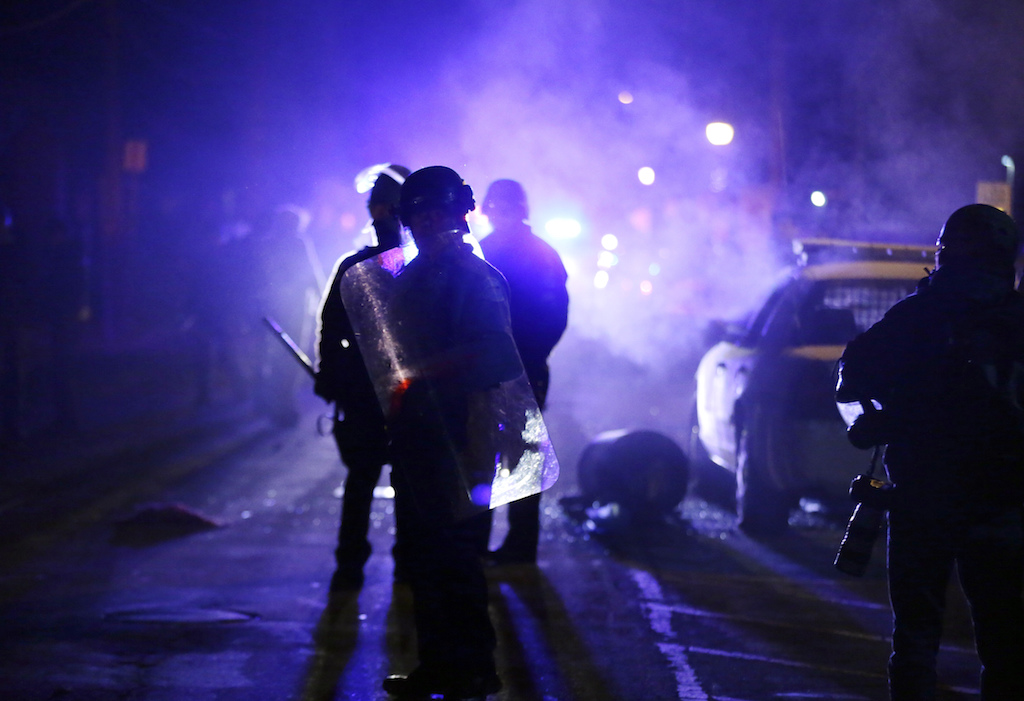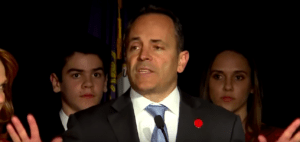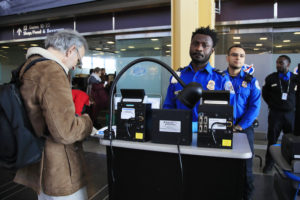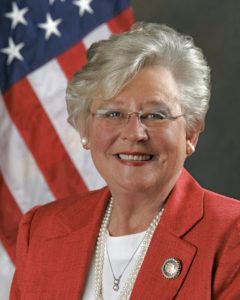Problem Officers Under Scrutiny in Criminal Justice Crusade
Anger over police shootings and wrongful convictions, often involving African Americans, fuels effort to make police reviews more transparent. Police officers watch protesters as smoke fills the streets in Ferguson, Mo., in 2014, following the fatal police shooting of 18-year-old Michael Brown. (Charlie Riedel / AP)
Police officers watch protesters as smoke fills the streets in Ferguson, Mo., in 2014, following the fatal police shooting of 18-year-old Michael Brown. (Charlie Riedel / AP)
BOSTON—During the 22 years he spent in prison after being convicted of killing a Boston police detective, Sean Ellis believed there was something suspicious about the officers who led the murder investigation. He just couldn’t prove it.
It would take years of digging and scores of public information requests from his attorneys to uncover evidence that several officers investigating the 1993 murder case were involved in criminal activity — information that wasn’t shared with the defense.
A Superior Court judge in 2015 ordered a new trial for Ellis and his murder charges were later dismissed.
Defense attorneys have long run up against a brick wall when trying to discover whether an officer has credibility issues that could set their client free.
But the case of Ellis and more recently, Philadelphia rapper Meek Mill, born Robert Williams, is fueling calls among civil liberty groups and reform-minded district attorneys to make the system more transparent. It is part of a larger call to address criminal justice reform at a time of growing anger over police shootings and wrongful convictions often involving African-Americans.
Five years after protests that erupted in Ferguson, Missouri, over the fatal shooting of unarmed teenager Michael Brown, activists have been pushing prosecutors to create lists of problem police officers, limit the use of the officers on them and review cases these officers worked to determine whether cases should be dropped or if defendants should be exonerated.
“In addition to charges, this is the other thing that prosecutors can be doing — making it very hard for officers to engage in the kind of conduct that should lead to them being fired,” said Scott Roberts, the senior director of criminal justice campaigns for Color of Change, an online racial justice organization, which is calling for prosecutors nationwide to create lists.
The Supreme Court ruled that prosecutors have a constitutional responsibility to share information favorable to the defense, including law enforcement officers with credibility issues. It is often called the Brady rule.
Wrongdoings that can land an officer on a so-called Brady list or database include lying on a police report, excessive force, bigoted comments or crimes such as drunken driving or domestic violence. Some lists also include officers under investigation, though they could be removed if the allegation is dismissed. Others have expanded the list to include lab technicians and others who might testify on the government’s behalf.
With no clear guidance from the courts on how that information should be shared, critics have chided prosecutors for failing to keep track of problem officers and going out of their way to keep information from the defense — either by failing to disclose the details about the officer, choosing not to put the officer on the stand or dropping a case altogether. Criminal justice advocates said the Brady rule violations have long been a problem and continue to pose a risk to innocent defendants.
“It’s a serious issue,” said Samuel Gross, the founder and senior editor of National Registry of Exonerations which has tracked 2,472 exonerations, mostly due to Brady violations. “We know from repeated scandals that there are a substantial number of officers who have engaged in concerted patterns of abuse and done dreadful things.”
In July, a Pennsylvania appeals court overturned Mill’s decade-old conviction on a drug and gun case over questions about the arresting officer’s credibility. Mill pleaded guilty this week to a misdemeanor gun charge in a deal that ends the legal limbo surrounding the 2007 arrest.
Several district attorneys have made these lists or databases central to their agendas while lawsuits in several states call for the list to be public.
In Philadelphia, District Attorney Larry Krasner, who was a defense attorney for 25 years, said he didn’t know a list existed when he took office. Krasner said there was no effort in the past to share the list of names — filed away under the name Damaged Goods — with defense attorneys. Krasner took over a list with less than 100 officers and created a larger database in which automatic notifications go out when a case involves a problem officer. The list could be expanded to include officers accused of making racist and violent social media posts.
Krasner doesn’t think anyone in the data base should be on the force, but he’s only limited to controlling their participation in cases.
“It is a position of public trust and people who are on that force may be called as witnesses in criminal matters,” he said. “It simply doesn’t make sense for the public to fund people who are incapable of doing the work.”
St. Louis Circuit Attorney Kimberly Gardner formalized an “exclusion list” with 58 names including nearly two dozen officers found to have written racists social media posts. Her office has also dismissed about 100 cases involving officers with credibility issues and ruled officers on the list may not be allowed to testify at trials or submit a case to her office.
“People want fairness and justice for all,” Gardner said. “No one wants to pick and choose when an officer decides to be credible. What is at stake is the whole criminal justice system.”
Harris County District Attorney Kim Ogg, which covers Houston, has formalized a system for its disclosure database that now includes 1,593 names going back to the 1980s — and allows a judge to decide if disclosure is necessary. Ogg’s office has dismissed 27 cases and is reviewing 1,400 other convictions after credibility issues emerged regarding one of the officers in a deadly drug raid. Prosecutors say the probe has grown to 14,000 cases.
“Every witnesses’ bias and credibility can be tested and police officers are no exception,” she said. “The idea is that the law is applied equally to everyone.”
Police unions have responded to the lists with lawsuits and lobbying to prevent the release of the names or limit their use by prosecutors.
“It’s unfair and improper to arbitrarily add officers to this list without some fair and balanced protocol,” John McNesby, president of the Philadelphia police union, said in a statement. “It’s damaging to officers’ reputations and livelihood.”
Many state laws prevent the data from being made public because it involves officers’ personal information. Some databases also include unredacted criminal investigative material that is not subject to public information laws. Lawsuits demanding the list be made public have been filed in New York and New Hampshire.
“Defendants have no idea whether prosecutors are making disclosure they need. Defendants have no idea whether police chiefs are sending the right names over to prosecutors,” said Gilles Bissonnette, the state legal director for the American Civil Liberties Union.
Harris County and St. Louis have refused to release the names as does Philadelphia.
But advocates for publicizing the police data have scored several legal victories of late.
A court in Philadelphia ordered Krasner last year to turn over the names from the previous list to an association of public defenders. And in New Hampshire, the ACLU and several media outlets successfully sued the state to have the list of 260 officers released. The state’s attorney general’s office has appealed the ruling to the New Hampshire Supreme Court.
The California Supreme Court this week ruled that a suspect’s right to a fair trial outweighs the privacy rights of officers who might have a history of bad behavior. Justices rejected a lower court ruling that barred the Los Angeles County Sheriff’s Department from giving prosecutors the names of deputies accused of improper conduct.
For Ellis, the debate over these lists comes too late.
Suffolk County prosecutors didn’t keep a list of officers’ names when Ellis was convicted in the killing of detective John Mulligan. It was created in 2013.
Ellis said he believes he wouldn’t have gone on trial if his defense team had known about the officers, several of whom pleaded guilty to federal conspiracy, civil rights and tax violations. Judge Carol Ball concluded that Ellis’ arrest was a rush to judgment based on an inadequate police investigation.
“I knew that this wasn’t right because I knew I didn’t do what I was accused of,” said Ellis, 45, who was sentenced to life after two mistrials.
He might have gone to college or been able to attend his father’s funeral. He would’ve been with his mother as she battled cancer. Instead, he was denied a request to go to his dad’s funeral.
He now lives with his mom and sister in Massachusetts and works as an administrative assistant earning $15 per hour.
“It’s like I lost my life,” Ellis said. “I went in as a teenager and here I am getting out as a 41 year old. I don’t believe what happened to me happens in a vacuum. I believe it’s common place. It’s the way the system works.”
___
Associated Press writer Jake Bleiberg contributed to this report from Dallas.
Your support matters…Independent journalism is under threat and overshadowed by heavily funded mainstream media.
You can help level the playing field. Become a member.
Your tax-deductible contribution keeps us digging beneath the headlines to give you thought-provoking, investigative reporting and analysis that unearths what's really happening- without compromise.
Give today to support our courageous, independent journalists.






You need to be a supporter to comment.
There are currently no responses to this article.
Be the first to respond.